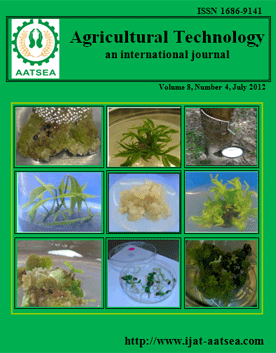ThaiScience
ThaiScience
INTERNATIONAL JOURNAL OF AGRICULTURAL TECHNOLOGY
Volume 14, No. 05, Month SEPTEMBER, Year 2018, Pages 631 - 652
Efficacies of essential oils from illiciaceae and zingiberaceae plants as oviposition deterrent, ovicidal, and adulticidal agents against females aedes albopictus (skuse) and anopheles minimus (theobald)
Cotchakaew, K. and Soonwera, M.
Abstract Download PDF
At present, serious mosquito vectors throughout the world have developed resistance to chemical insecticides.Therefore, safe natural products for controlling mosquitoes are absolutely necessary. This study investigated the efficacy of herbal essential oil (EO) from Illiciaceae and Zingiberaceae plants, Alpinia galanga (A. galanga), Amomum krervanh (A. krervanh), Curcuma zedoaria (C. zedoaria), Illicium verum (I. verum), Zingiber cassumunar (Z. cassumunar) and Zingiber mekongense (Z. mekongense) against the females of Aedes albopictus (Ae. albopictus) and Anopheles minimus (An. minimus). All EOs at the high concentration (10%) were highly effective in oviposition deterrent, ovicidal, and adulticidal activities. Ten percent of C. zedoaria EO showed 100% effective repellency with an oviposition activity index (OAI) of -1.0 against the females of the two mosquito species, and 10% I.verum EO showed a high inhibition rate of 100% against the eggs of the two mosquitoes. Ten percent of A. galanga EO showed a high adulticidal activity against the females of Ae. albopictus and An. minimus with KT50 of 0.7 and 1 min at 1h, respectively, and 100% mortality at 24h as well as an LC50 of 7.5 and 2.9%, respectively. When compared with temephos and cypermethrin, the EOs from C. zedoaria, I.verum and A. galanga were more effective in oviposition deterrent and ovicidal activities than temephos and were equivalent in adulticidal activity to cypermethrin. To conclude, our data show that EOs from C. zedoaria, I.verum and A. galanga can be used as an oviposition deterrent, ovicidal and adulticidal agents against Aedes albopictus and Anopheles minimus.
Keywords
Herbal essential oil, Oviposition deterrent, Ovicidal activity, Adulticidal activity, Aedes albopictus, Anopheles minimus.INTERNATIONAL JOURNAL OF AGRICULTURAL TECHNOLOGY
Published by : Association of Agricultural Technology in Southeast Asia (AATSEA)
Contributions welcome at : http://www.ijat-aatsea.com
